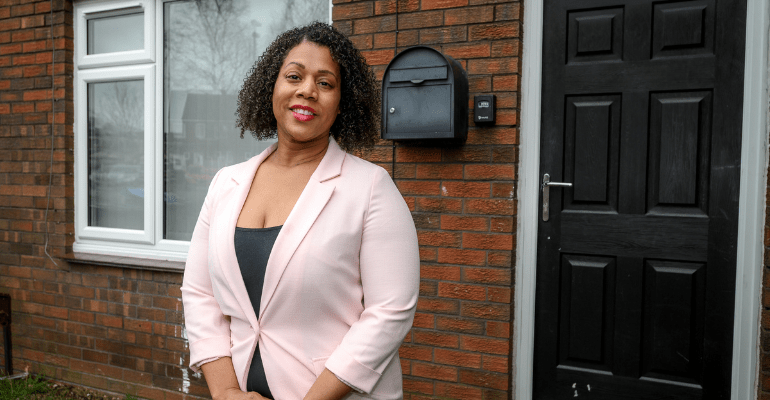
Property auctions: an in-depth guide.
This beginner's guide is here to help you understand how they work and how you can take part in one.
Get a decision in principle or enquire
Your home may be repossessed if you do not keep up repayments on your mortgage.
Looking for Auction finance?

Why buy property at auction?
If you’re new to the auction world, you might be wondering why it’s such a popular way to invest in property. It isn’t just about picking up a bargain – it brings with it a whole raft of other benefits.
An auctioneer will stand at the front of the auction room and officiate proceedings, whether in the room or in front of a camera and streamed to an online audience, with competing bidders raising their hand or submitting their bid online.
The auction is organised by an auction house. As well as bidders in the room, during the auction there is likely to be a team from the auction house on the phones, helping people who can’t attend in person to place their bids.
Where can I find auction properties?
Auction houses typically list upcoming lots on their website in advance and produce a catalogue that’s available in the auction room. For a full list of what is coming to auction you can visit www.eigpropertyauctions.co.uk.
When browsing online, you’ll find a ‘Guide Price’ – which is a good indication as to where the reserve is currently set and not necessarily an indication as to what the lot will sell for. You may also find photos, a written description, a floorplan, and a copy of the property’s Legal Pack.
It's also recommended because if it's outside your range it may not be worthwhile incurring costs on due diligence.
The auctioneer may also have a number of pre-made bids ‘on the book’ to counter against bids in the room.
Once the hammer goes down, the winner will be asked to show their number. The winner will then be required to attend the Contracts table to sign the Memorandum of Sale.
Your number will be assigned when you arrive and register at the auction. If you want, you can choose not to register and simply observe instead.
Get a decision in principle or enquire
What property types can I buy at auction?
At auction, the range of lots is hugely varied and introduces some property you’re unlikely to see in an estate agent’s window. This means there’s often more potential to make a profit too.
Many of the lots are offered by property companies whose primary focus is speed and certainty of sale.
An increasing number of lots are being offered on a conditional basis by home owners that need to sell in a hurry and will accept a lower price to achieve a quick sale.
Some of the properties you may see being sold at auction include:
- those deemed ‘unmortgageable’ by some mortgage providers, because of their condition, construction materials, or similar issues
- properties with sitting tenants
- conversion opportunities
- those that could be split into several, smaller units
- semi-commercial properties (e.g. flats above retail units, where both are included in the sale)
- land
- commercial property
Understand the detail
Whenever you’re planning to buy at auction, reading the small print can make a big difference. So it’s important to read and understand all the legal details. The Legal Pack – prepared by the vendor’s conveyancer – is a vital read and can seem a little daunting. But with the right help, it’s more straightforward than you think.
If you need help with finding a solicitor, or have any questions about the legal pack, get in touch and we’ll be happy to help.
What is the Legal Pack, exactly?
It’s a bundle of documents prepared by a conveyancer on behalf of someone who’s selling a property at auction. They’re made available by the auction house for any buyer to review before the auction, and should provide all the information needed to decide whether to go ahead with a bid.
What do I do with the Legal Pack?
You need to read and understand all the papers in the Legal Pack – or appoint a conveyancer who has experience in the property market to read them for you. When you buy at auction, the transaction is subject to everything in the Legal Pack, so it’s really important.
What’s included in the Legal Pack?
- Office copy entries – these are certified copies of the land or charge certificate, obtained from the Land Registry, confirming the ownership of a property.
- Lease – this will detail the outstanding lease (if the property is leasehold).
- Land Registry and other searches – this contains information regarding flood risk, nearby planned infrastructure works, and so on.
- Tenancy agreements – these are included if the property is a buy-to-let that comes with a sitting tenant.
- Management information pack – otherwise known as a ‘Leasehold information pack’, and included for leasehold properties with information about ground rent, service charges, and so on.
- Fixtures and fittings form – this discloses what's included with the property, such as carpets, curtains, and kitchen and bathrooms fitments.
- Property information form – a standardised form for the vendor to make declarations regarding the property’s history, boundaries, disputes, guarantees, and more.
- Planning permission documentation – this notes any nearby planning applications affecting the property, whether historical or current.
- Special conditions of sale – this details the completion date (normally – but not always – 28 days from the date of the auction), covenants, restrictions on occupation (e.g. minimum age in retirement properties), any additional disbursements that are payable when you complete, and similar notes.
- Replies to pre-contract enquiries – this shares answers to questions that others have asked about the property ahead of the sale.
Online property auctions
Don’t fancy the journey to your nearest auction house? You can bid and buy online instead.
Online auctions work in a different way to traditional auctions. At a traditional auction, bidding is completed in a matter of minutes, and sometimes even seconds. And when the gavel falls, you’ve effectively exchanged contracts and will immediately need to pay 10% of the purchase price.

How online auctions differ
Online auctions normally take place over a number of days (rather than minutes, as with a traditional auction). During this time, buyers register and place their bids.
A late bid can result in the deadline for bids being extended by a minute; so there’s no advantage to swooping in at the last moment to outbid someone. A sale is only complete when there have been 60 seconds of ‘silence’.
Some sellers like these auctions because they don’t need to pay towards room hire and catalogue printing, and can quickly enter the property into another auction if it doesn’t sell.

Completion timescales
Unlike traditional auctions, some online auctions are 'conditional' or 'modern method'. Rather than binding the winning bidder to the sale, the fall of the virtual hammer gives them a 28-day exclusivity period in which to exchange contracts, and 56 days in which to complete. So there may be time to get a traditional mortgage. However, some online auctions work just like you’re in a physical auction room and you’ll have 28 days to complete if you’re the winning bidder. So make sure you check what kind of auction it is, in advance.
Prepare for auction with our top tips
Common questions about property auctions
How do you pay for auction purchases?
On the day of the auction, you'll need to pay a deposit (typically 10%) plus some additional fees, either by credit or debit card. Dependent on the type of auction you then usually have between 28 and 56 days (or possibly less) to pay the balance in full. If you don’t pay within the agreed timeframe, you’ll lose your deposit and your right to purchase the property.
You may also have to cover the costs associated with selling the property again. If you’ve got the money in the bank, you can make a payment by bank transfer. But if you need to borrow the money, you’ll need to engage a mortgage provider, like Together.
There are several options in terms of lending products. If you're buying a property to live in, you will need a residential mortgage. You may need a short-term bridging loan, ideal if you’re hoping to renovate the property before selling it on or arranging, for instance, a buy to let mortgage.
Together can talk you through the options, so you can find the right product for your circumstances. For instance, our Auction finance can often be arranged much more quickly than a traditional mortgage – so if you intend to rent the property to tenants, you will need a buy to let mortgage. If you’re close to your deadline, you may choose this to help protect your deposit.
Who are you bidding against?
You’re competing only with other auction-goers.
Thousands of people browse estate agents’ property listings online via sites like Zoopla or Rightmove, which can put you up against countless other potential buyers. And this could make securing a sought-after property, at the right price, very tricky.
At auction, you’re bidding just against those in the room, online or on the telephone who might be interested in the same property. And you know very quickly how much you’ll have to pay to make it yours – no more putting in an offer and hoping for the best.
Do negotiations take a while?
When the hammer falls, the contract between the winning bidder and the vendor is legally binding.
There’s no waiting around for the vendor to consider an offer and no stressful negotiations – so you can get on with completing the transaction. Deadlines are short and you should have the keys within a month or two.
What are auction reservation fees?
At the end of the auction, the highest bidder wins and pays a reservation fee. This is set by the estate agent or auction platform and a minimum value often applies.
The reservation fee isn't a deposit so you pay it on top of the purchase price. It's non-refundable if you pull out after winning the auction. But if the seller pulls out, you should get this back.
You should also know that the reservation fee will be considered part of the purchase price for purposes of calculating your stamp duty obligations.

Get pre-approved
Get a decision in principleYour home may be repossessed if you do not keep up repayments on your mortgage.
All lending decisions are based on lending criteria and, where applicable, subject to credit check and an assessment of individual circumstances.
All mortgages are subject to our terms and conditions.
Loans offered by Together Commercial Finance Limited are not regulated by the Financial Conduct Authority.





